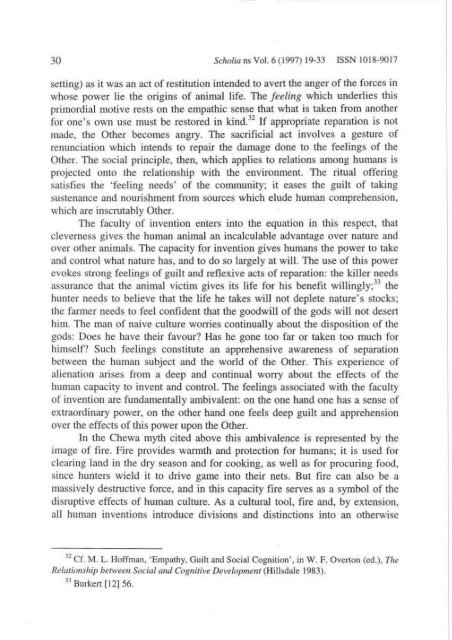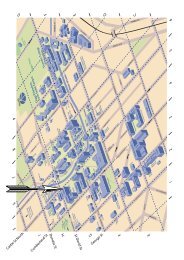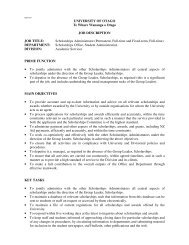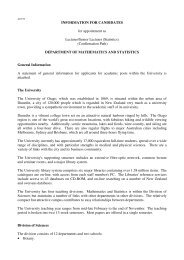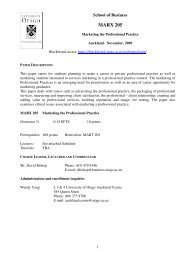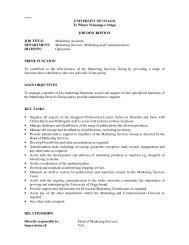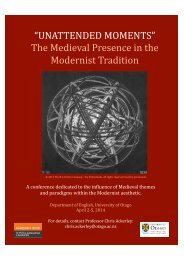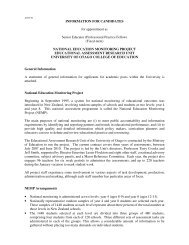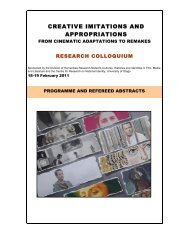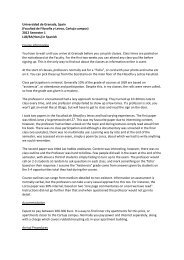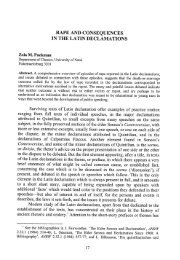scholia - University of Otago
scholia - University of Otago
scholia - University of Otago
You also want an ePaper? Increase the reach of your titles
YUMPU automatically turns print PDFs into web optimized ePapers that Google loves.
30 Scholia ns Vol. 6 ( 1997) 19-33 ISSN I 018-90 17<br />
setting) as it was an act <strong>of</strong> restitution intended to avert the anger <strong>of</strong> the forces in<br />
whose power lie the origins <strong>of</strong> animal life. The feeling which underlies this<br />
primordial motive rests on the empathic sense that what is taken from another<br />
for one's own use must be restored in kind. 32 If appropriate reparation is not<br />
made, the Other becomes angry. The sacrificial act involves a gesture <strong>of</strong><br />
renunciation which intends to repair the damage done to the feelings <strong>of</strong> the<br />
Other. The social principle, then, which applies to relations among humans is<br />
projected onto the relationship with the environment. The ritual <strong>of</strong>fering<br />
satisfies the 'feeling needs' <strong>of</strong> the community; it eases the guilt <strong>of</strong> taking<br />
sustenance and nourishment from sources which elude human comprehension,<br />
which are inscrutably Other.<br />
The faculty <strong>of</strong> invention enters into the equation in this respect, that<br />
cleverness gives the human animal an incalculable advantage over nature and<br />
over other animals. The capacity for invention gives humans the power to take<br />
and control what nature has, and to do so largely at will. The use <strong>of</strong> this power<br />
evokes strong feelings <strong>of</strong> guilt and reflexive acts <strong>of</strong> reparation: the killer needs<br />
assurance that the animal victim gives its life for his benefit willingly; 33 the<br />
hunter needs to believe that the life he takes will not deplete nature's stocks;<br />
the farmer needs to feel confident that the goodwill <strong>of</strong> the gods will not desert<br />
him. The mao <strong>of</strong> naive culture worries continually about the disposition <strong>of</strong> the<br />
gods: Does he have their favour? Has he gone too far or taken too much for<br />
himself? Such feelings constitute an apprehensive awareness <strong>of</strong> separation<br />
between the human subject and the world <strong>of</strong> the Other. This experience <strong>of</strong><br />
alienation arises from a deep and continual worry about the effects <strong>of</strong> the<br />
human capacity to invent and control. The feelings associated with the faculty<br />
<strong>of</strong> invention are fundamentally ambivalent: on the one hand one has a sense <strong>of</strong><br />
extraordinary power, on the other hand one feels deep guilt and apprehension<br />
over the effects <strong>of</strong> this power upon the Other.<br />
In the Cbewa myth cited above this ambivalence is represented by the<br />
image <strong>of</strong> fire. Fire provides warmth and protection for humans; it is used for<br />
clearing land in the dry season and for cooking, as well as for procuring food,<br />
since hunters wield it to drive game into their nets. But fire can also be a<br />
massively destructive force, and in this capacity fire serves as a symbol <strong>of</strong> the<br />
disruptive effects <strong>of</strong> human culture. As a cultural tool, fire and, by extension,<br />
all human inventions introduce divisions and distinctions into an otherwise<br />
32 Cf. M. L. H<strong>of</strong>fman, ' Empathy, Guilt and Social Cognition', in W. F. Overton (ed.), The<br />
Relmionship between Social and Cognitive Development (Hillsdale 1983).<br />
33 Burkert [12] 56.


